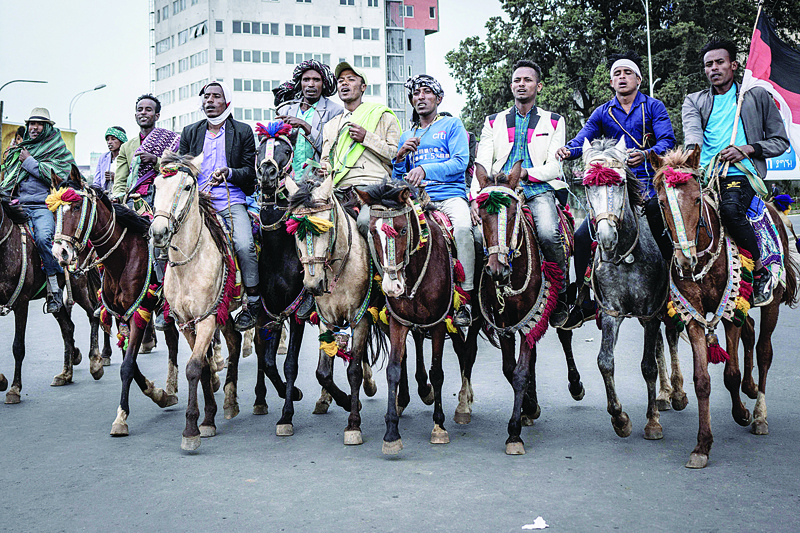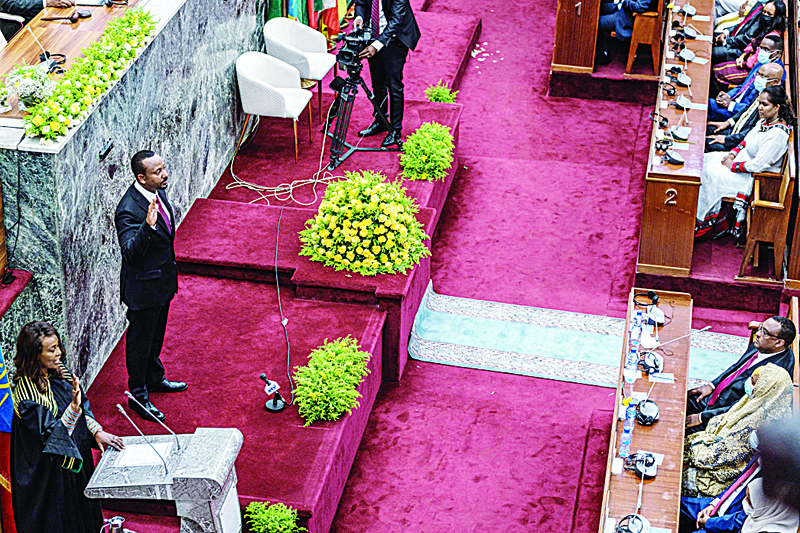 ADDIS ABABA: Horse riders are on a street as Ethiopian Prime Minister Abiy Ahmed is sworn in for a new five-year term in Addis Ababa, Ethiopia yesterday. - AFP photos
ADDIS ABABA: Horse riders are on a street as Ethiopian Prime Minister Abiy Ahmed is sworn in for a new five-year term in Addis Ababa, Ethiopia yesterday. - AFP photos
ADDIS ABABA: Ethiopian Prime Minister Abiy Ahmed was sworn in for a new five-year term yesterday, but the milestone risked being undermined by growing alarm over the war in the north. Abiy's Prosperity Party scored a landslide win in June elections that federal officials touted as the high-water mark of democratic reforms he initiated upon taking office in 2018.
Yet by the time voters cast their ballots, tens of thousands had been killed in the conflict in the northern Tigray region and hundreds of thousands faced famine-like conditions, according to the UN, tarnishing the 2019 Nobel Peace Prize winner's once-glowing reputation. Since then, fighting has spread to neighboring Afar and Amhara regions while Tigray has fallen under what the UN describes as a de facto humanitarian blockade, spurring fears of the mass starvation that turned Ethiopia into a byword for famine in the 1980s.
 ADDIS ABABA: Abiy Ahmed (2nd left), Prime Minister of Ethiopia, swears in front of the parliament as reelected Prime Minister during a swearing-in ceremony for recently elected members yesterday. - AFP
ADDIS ABABA: Abiy Ahmed (2nd left), Prime Minister of Ethiopia, swears in front of the parliament as reelected Prime Minister during a swearing-in ceremony for recently elected members yesterday. - AFP
It is unclear whether Abiy's swearing-in will alter the course of the war pitting government troops against the Tigray People's Liberation Front (TPLF) rebel group, which dominated national politics before he took power. Abiy's office, which blames the rebels for starting the war last November with attacks on federal army camps, has said certain conciliatory measures such as declassifying the TPLF as a terrorist group can only happen after a new government is formed.
International partners like the United States "will be looking at this closely to see if there is any shift in position", William Davison, senior Ethiopia analyst for the International Crisis Group, told AFP. Abiy's government has come under withering criticism for its conduct of the war, notably from Washington, a longtime ally. US President Joe Biden in September signed an executive order allowing for sanctions against the warring parties if they fail to commit to a negotiated settlement.
'Let down'
Relations between Ethiopia and the international community soured further last week when the foreign ministry announced the expulsion of seven senior UN staff, including the local heads of the UN children's agency UNICEF and its humanitarian coordination office. Those officials had left the country by Sunday, UN sources told AFP. A joint statement issued yesterday on behalf of more than 40 countries and read out by Simon Manley, the UK's ambassador to the UN in Geneva, expressed shock and dismay over the expulsions and urged a reversal.
"Their work is vital in responding to the multiple humanitarian crises that Ethiopia is facing, and to the continuing reports of human rights violations and abuses," the statement said, referring to the expelled officials. Western powers feel "let down" by Abiy, a dynamic that will shape foreign relations during his second term, said Cameron Hudson, senior fellow at the Atlantic Council's Africa Center. "The West will likely now revert to a playbook it knows... apply pressure where it can, engage where it must, and keep on the lookout for better alternatives," Hudson told AFP.
Ethiopian officials accuse the international community of ignoring abuses committed by the TPLF. Yesterday, President Sahle-Work Zewde, who holds a largely ceremonial role, took a combative tone in a speech to lawmakers after Abiy's swearing-in. "There has been an effort to destabilize our sovereignty, unity and societal co-existence," she said. "However, those Ethiopians who won't negotiate on their country's pride and existence have managed to foil the conspiracy devised to destroy Ethiopia by external enemies and domestic traitors."
'New beginnings'?
Ahead of the ceremony, signs bearing a flower and the words "New Beginnings" were posted around the capital. Abiy was appointed after several years of anti-government protests against the ruling TPLF-led coalition and promised to break with Ethiopia's authoritarian past, in part by holding the most democratic polls the country had ever seen. Once his new government is in place, he will have to confront what Awet Weldemichael, a Horn of Africa security expert at Queen's University in Canada, called "a trifecta of crises": the war itself and its humanitarian and economic fallout.
Many analysts expect fighting to pick up now that the rainy season is ending, Awet noted. "The upcoming wave of fighting and worsening humanitarian conditions are a further hit on his international standing and a test to his new government from day one." Abiy was expected to speak at a mass rally in Addis Ababa's Meskel Square, to be attended by dignitaries including the presidents of Nigeria, Somalia, Senegal and Djibouti. - AFP









